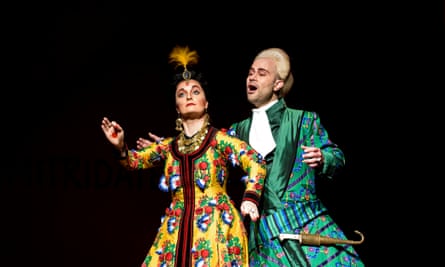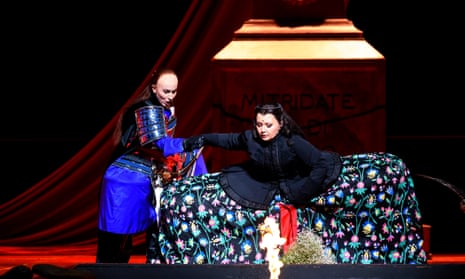In its cross-cultural hash – whirling dervish, kabuki mask, baroque gesture, classical peruke, all suffused in dazzling colour – the Royal Opera production of Mozart’s Mitridate, re di Ponto is certainly spectacular. Gleaming and highly stylised, characters wearing wide hooped skirts in which they can scarcely move, it has the disconcerting feel of a silhouette on the rim of the world. Who are these androgynous, mostly high-voiced people? Why reveal the eponymous king is a cruel monster only halfway through? How can he regain dignity by killing himself in that cowardly fashion? At least, paradoxically, his death allows for a more-or-less happy ending.
Mozart wrote Mitridate, based on Racine’s tragedy, when he was 14, which explains the work’s unevenness. Alongside the miracle of promise, there’s plenty that is humdrum. Despite the conductor Christophe Rousset’s energetic tempi, most of the score remains steadfast, rhythmically and harmonically, with only a few forays into syncopation and deviation – enough to hint at the genius to come. Making his overdue ROH debut, Rousset also played harpsichord continuo (with Christopher Vanderspar on cello) and conjured fresh, agile playing from the orchestra.
The youthful Mozart’s real talent is more keenly evident in the vocal writing. Early on, the lead female role, Aspasia (Albina Shagimuratova), has a showcase aria bemoaning her predicament. And quite a plight it is. Betrothed to the absent king, she is adored by his two sons and loves the younger and nicer brother, Sifare (the Georgian soprano Salome Jicia, pert and vigorous). Inevitably honour threatens to get in the way.
Wearing walk-in-wardrobe-sized panniered skirts patterned in Anatolian floral designs, the Russian Shagimuratova looked as if she carried the entire world round her hips, or at least the hanging gardens of Babylon. The weight of the costume appeared to hamper, as it were, her high notes, which at first sounded forced. Yet as the evening progressed she relaxed, pinpoint accuracy and coloratura strength restored, especially on those occasions she was allowed to roam free, sans basket.

She and Jicia’s Act 2 duet was a high point in an opera of solo numbers, some extraordinarily long. The American Michael Spyres in the light tenor role of Mitridate, American countertenor Bejun Mehta as the more treacherous brother Farnace and, particularly, English soprano Lucy Crowe in radiant, fiery voice as Ismene led this first-rate cast. Last seen in 2005, Graham Vick’s 1991 production, with designs by Paul Brown and movement by Ron Howell, cannot be revived too often, given the work’s marginal place in the repertoire. It deserves to survive for a few more decades yet.
With its claustrophobic man-o-war setting, all tricorns and bayonets and gaiters, Britten’s Billy Budd (1951) is jagged enough in a full-scale production. Pared down to a concert staging, it takes on the clarity of a stark woodcut. When delivered with the simple brilliance of Matthew Eberhardt’s version for Aldeburgh, music and drama unite in perpetual trepidation.
Two performances of the opera marked the culmination of this year’s annual Suffolk festival, founded by Britten and friends in 1948. Surprisingly it was the first time Billy Budd had been performed at Snape Maltings, the festival’s main home, which is half a century old this year and has a raftered interior not unlike an upturned boat (as well as the most back-and-bum-punishing seats, whatever your shape or size, in any concert hall, quite a feat).
Based on Opera North’s 2016 production, astutely conducted by Garry Walker and with the same two principal singers – Alan Oke as Captain Vere and Roderick Williams in the title role – this semi-staging gave a chance to hear the company’s orchestra in full flight, illuminating the glints and shadows of Britten’s miraculous score. The musicians occupied the full stage, with chorus – fabulously loud and lusty – in a block behind, soloists out in front, with no props except a telescope or two, white ties for the officers and black shirts for the sailors.
It was a nimble solution to establishing the hierarchy on board HMS Indomitable: the destructive energy that powers the opera. Oke has perfected the role of “Starry” Vere, the elegant, sensitive sea captain haunted by his part in Billy’s death. The baritone Roderick Williams has the spirited generosity needed for Budd, as well as the golden-toned voice to express the role’s essential, painful poetry. Brindley Sherratt’s cold, tight-lipped Claggart led a responsive ensemble cast. All, together with Opera North’s chorus and orchestra, performed with heart and soul.
Katharina Thoma’s 2013 production of Richard Strauss’s Ariadne auf Naxos, overburdened with ideas (oh no), is back at Glyndebourne, less fussy but still a jumble. It’s 1940, an English country house, German bombs, a field hospital. Thomas Allen was back as Music Master, igniting the actions of a terrific cast, conducted by Cornelius Meister with sumptuous playing from the London Philharmonic Orchestra (and a notably graceful clarinet solo at the start of Act 2). As ever in this work, the women’s voices stole the show. Erin Morley’s sizzling, ever susceptible Zerbinetta, Angela Brower’s Composer and the three impeccable nymphs alone would have made the show worthwhile. The sensation was the Ariadne of Lise Davidsen. The young Norwegian soprano’s voice, silken at the top, rich with deep mezzo colours, pours forth flawlessly as if in one clear, stupendous breath. It’s one of the greatest voices I have heard. She makes her Proms debut on 10 August.
Star ratings (out of 5)
Mitridate, re di Ponto ★★★★
Billy Budd ★★★★★
Ariadne auf Naxos ★★★★
- Mitridate, re di Ponto is in rep at the Royal Opera House, London until July. Ariadne auf Naxos is in rep at Glyndebourne, Lewes until 27 July

Comments (…)
Sign in or create your Guardian account to join the discussion